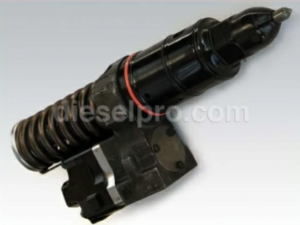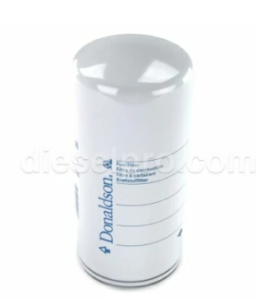Diesel Fuel System Overview

The diesel fuel system in the Detroit Diesel Series 60 engine is engineered for precise fuel delivery and combustion efficiency. It powers the engine by injecting high-pressure atomized fuel directly into the combustion chambers, ensuring consistent performance under varying loads.
Parts Catalog for 11.1L Detroit Diesel 60 Series Marine Engine
Parts Catalog for 12.7L Detroit Diesel 60 Series Marine Engine
Parts Catalog for 14L Detroit Diesel 60 Series Marine Engine
Key Components:
- Fuel Tank and Lines: Store and transport fuel to the engine.
- Fuel Pump: Pressurizes and delivers fuel to the injectors.
- Electronic Unit Injectors (EUI): Precisely control the timing and amount of fuel injected into each cylinder.
How the Fuel System Powers the Series 60 Engine:
- Fuel Delivery:
- The fuel pump draws diesel from the tank, filtering it to remove impurities before delivering it under high pressure.
- Fuel is distributed to each injector, where electronic controls regulate injection timing and quantity.
- Injection and Combustion:
- Injectors atomize the diesel into the combustion chambers.
- High-pressure injection ensures thorough mixing of fuel with compressed air, promoting efficient combustion.
- Return System:
- Excess fuel is recirculated to the tank, helping to cool the injectors and prevent vapor lock.
- Excess fuel is recirculated to the tank, helping to cool the injectors and prevent vapor lock.
Diagnosing and Fixing Fuel Delivery Problems:
- Symptoms:
- Engine misfires, loss of power, or hard starts.
- Excessive smoke from the exhaust or poor fuel economy.
- Troubleshooting Steps:
- Inspect fuel lines for blockages or leaks.
- Test pump pressure using a fuel pressure gauge to ensure it meets specifications.
- Examine filters for clogs and replace if needed.
- Solutions:
- Repair or replace damaged fuel lines.
- Clean or replace clogged filters.
- Service or replace a failing fuel pump.
Pro Tip: Always bleed air from the fuel system after replacing components to avoid starting issues.
Electronic Unit Injectors (DDEC I-V Systems)

The Detroit Diesel Electronic Controls (DDEC) system integrates advanced technology to optimize fuel delivery, reduce emissions, and enhance engine performance. The system includes multiple injector versions, tailored for specific engine configurations.
Features and Maintenance of the DDEC Fuel Systems:
- High-Precision Injection:
- Electronically controlled injectors ensure precise fuel delivery for each cylinder.
- Sensors monitor engine parameters to adjust fuel flow in real-time.
- Self-Diagnostics:
- The system logs error codes to assist in diagnosing issues.
- Use diagnostic tools to retrieve and interpret fault codes for maintenance.
- Regular Maintenance:
- Inspect injector wiring harnesses for damage or wear.
- Replace injectors at recommended intervals to maintain efficiency.
Differences Among DDEC Versions and Their Servicing Needs:
- DDEC I & II:
- Older systems with simpler diagnostics and control features.
- Inspect the EDU (Electronic Distributor Unit) for performance.
- DDEC III & IV:
- Enhanced fuel timing and delivery with integrated ECMs.
- Focus on injector solenoid functionality and precise calibration during replacement.
- DDEC V:
- Advanced diagnostics and emissions control features.
- Requires specialized tools for injector programming and calibration.
Pro Tip: Always use genuine or premium aftermarket injectors compatible with your DDEC version to ensure performance and durability.
Fuel Pump and Filter Systems

Proper maintenance of the fuel pump and filters is crucial for keeping fuel clean and ensuring consistent delivery pressure.
Keeping Fuel Clean with Proper Filter Maintenance:
- Inspection and Replacement:
- Check fuel filters for clogs or contamination during regular maintenance.
- Replace filters every 15,000 miles or as specified by the manufacturer.
- Water Separation:
- Use filters with integrated water separators to prevent corrosion in the fuel system.
- Drain water from separators regularly to maintain efficiency.
- Clean Fuel Lines:
- Inspect lines for dirt, blockages, or algae growth.
- Flush contaminated lines and replace severely damaged sections.
Ensuring Optimal Pump Pressure for Injection:
- Pressure Testing:
- Use a pressure gauge to verify that the pump delivers adequate pressure to the injectors.
- Ensure pressures meet specifications outlined for the Series 60 engine.
- Pump Servicing:
- Replace worn pump seals to prevent leaks.
- Address signs of wear or failure promptly to avoid engine misfires or stalling.
Pro Tip: Always prime the fuel system after replacing filters or pumps to eliminate air pockets that can disrupt fuel flow.
Natural Gas Fuel System Components
The natural gas variant of the Series 60 engine features a specialized fuel system that differs significantly from diesel configurations. These systems rely on compressed natural gas (CNG) or liquefied natural gas (LNG) as fuel.
Special Components and Safety Tips for Natural Gas Variants:
- Components:
- Fuel Mixer: Combines natural gas with air before entering the cylinders.
- Pressure Regulators: Reduce high-pressure gas to a usable level for combustion.
- Ignition System: Includes spark plugs to ignite the air-fuel mixture, as opposed to compression ignition in diesel engines.
- Safety Tips:
- Regularly inspect CNG tanks for leaks or damage.
- Ensure pressure regulators function correctly to prevent over-pressurization.
- Store natural gas cylinders in ventilated areas away from heat sources.
Inspection and Leak-Checking Procedures:
- Visual Inspection:
- Check for cracks, loose fittings, or worn hoses in the fuel system.
- Inspect fuel tanks and valves for damage or leaks.
- Leak Testing:
- Use an approved leak detection solution on fittings and connections.
- Monitor for bubbles, indicating a leak, and repair immediately.
- System Testing:
- Ensure pressure readings align with system specifications.
- Perform periodic audits of the entire system to identify potential failures.
Pro Tip: Follow strict safety guidelines during maintenance to minimize the risk of fires or explosions associated with natural gas systems.
By maintaining the fuel system in optimal condition, technicians can ensure the Detroit Diesel Series 60 engine delivers peak performance while adhering to safety and efficiency standards. This comprehensive understanding of both diesel and natural gas configurations equips professionals to handle a wide range of fuel-related challenges.
Parts Catalog for 11.1L Detroit Diesel 60 Series Marine Engine
Parts Catalog for 12.7L Detroit Diesel 60 Series Marine Engine
Parts Catalog for 14L Detroit Diesel 60 Series Marine Engine



 Free US Calls: 1-888-433-4735
Free US Calls: 1-888-433-4735 International: 305-545-5588
International: 305-545-5588
Any performance makers like Banks out there for the Inline 6-71 Detroit??